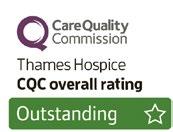




Welcome to the Thames Hospice Quality Account 2024/2025. This publication is an important part of our accountability to the many individuals and groups with a stake in the work of Thames Hospice.
We are delighted to provide you with this summary of the quality initiatives that we have undertaken throughout the financial year, and to give you a high-level overview of some of our plans for the future. You are important to us, and we know you want to be assured of our attention to the quality of our services and our efforts to continuously improve wherever we can.
I was appointed Chief Executive of Thames Hospice in December 2024 and bring a wealth of clinical and strategic leadership experience to the charity. Before joining, I was Deputy Chief Executive and Chief Medical Officer of the Buckinghamshire, Oxfordshire, and Berkshire West Integrated Care Board (BOB ICB), and responsible for shaping healthcare services across the three counties. Alongside my role at the Hospice, I continue to practice as a Consultant in Emergency Medicine at the Royal Berkshire NHS Foundation Trust.
My connection to hospice care is deeply personal. Having lost both my parents to cancer, I experienced first-hand the profound impact of hospice services. When I reflect on this time, I recognise that support from the local hospice allowed me to stop being a doctor to my father, and allowed me to ‘just’ be his daughter and make precious memories together.


Dr Rachael de Caux
However, there is increasing demand for our services, driven by an ageing population with more complex diagnoses, and an urgent need to do more to reach parts of our community who have not had access to our care. We have ambitious plans and priorities for the next three years to meet the challenges ahead. Our priorities include a focus on delivering the best quality of care to support patients and families and improving equity of access to our services. We are committed to ensuring that we are a place of hope and are dedicated to providing care and support to all those who need us today and for generations to come.
We have continued to focus our efforts on increasing support for people being cared for in the wider health and social care system. Our Inpatient Services ran at 84% occupancy over the year, and our Hospice at Home provision has again seen increased activity, with our Virtual Ward enabling us to care for more acutely unwell people in their own homes, rather than them being admitted to hospital or the Hospice. Once again, our patient satisfaction results have been exceptional, and you will find a few of the many accolades we received this year on page 18.
Our concept of ‘Care with Agility’ is significantly improving the co-ordination and integration of our services with our wider healthcare partners. There have been significant reductions in waiting times for admission to our services, and our patients have a far clearer expectation of what we offer to support them and their loved ones.
Your views on how we are doing are very important to us. If you would like to pass on a message to any of our teams or suggest ways that we can improve our services, please use our online form at www.thameshospice.org.uk/get-in-touch or email intouch@thameshospice.org.uk If you would prefer to speak to someone in person, please contact our Director of Nursing Loren Broughton on 01753 842121.
A top priority for the Clinical Team is always patient safety. We have continued to focus on identifying and earlier reporting of pressure ulcer changes in a patient’s pathway, as well as mitigating the risk of patient falls. We report and learn from any medication errors across all our services.
We continue to engage in constructive dialogue with our Commissioners to help to shape and fund our direct clinical care, including negotiating new contractual arrangements with our NHS partners to secure a fair deal for future years. We work with colleagues across the local health and adult social care sector, to support the delivery of Frimley and BOB ICB’s palliative and end–of-life care priorities.
Thank you for taking the time to read our 2024/2025 Quality Account. We hope it gives you greater insight into our work and ambitions. To the best of my knowledge it is an accurate and fair representation of the quality of services that Thames Hospice provides.

We are immensely proud of all that we have achieved since we were founded in 1987, providing specialist palliative and end-of-life care and support for our community across East Berkshire and South Buckinghamshire.
Today we serve a population of approximately 500,000 people and employ more than 360 staff who, with the support of over 1,000 volunteers, deliver care to thousands of people each year.
Whether in the Hospice or at home, our care, provided free of charge to patients and their loved ones, is tailored to meet their physical, psychological and spiritual needs. Our services are only possible thanks to the generosity of our community. Our supporters help us in many ways by donating, fundraising, volunteering, as well as shopping in our charity stores and so much more.

can get involved at www.thameshospice. org.uk/supportus
Referrals to our four key services are centrally co-ordinated by our Single Point of Access team and delivered by our multi-disciplinary colleagues, who work closely together to give our patients dignity, comfort and the best possible quality of life in their preferred place of care.
£39,000
We need to raise every day to continue delivering our vital care.
Inpatient Services are delivered in our Inpatient Centre at the Hospice for patients who need specialist palliative and end-of-life care.
Hospice at Home Services are provided to people in their own homes, who need specialist palliative and end-of-life care. Our community care is delivered in partnership with GPs, District Nurses and other healthcare professionals. Services include proactive and responsive clinical support, consultant-led care on our Virtual Ward and end-of-life domiciliary care.
Hospice Outpatient Services help people diagnosed with a life-limiting condition remain independent by supporting them through tailored programmes of wellbeing and therapeutic care within our Paul Bevan Wellbeing Centre at the Hospice. We also offer early care planning to help anticipate and achieve patients’ future care needs. Our provision includes structured outpatient programmes, lymphoedema services, physiotherapy and complementary therapy.
Counselling, Pastoral and Bereavement Services offer psychological, emotional and spiritual support for patients and families up to and following bereavement. This includes counselling for children and young people. We also support essential outreach work for underrepresented groups of patients.
Loren Broughton Medical Director and Deputy CEO Trustee and Chair, Patient Care and Quality Committee Director of Nursing
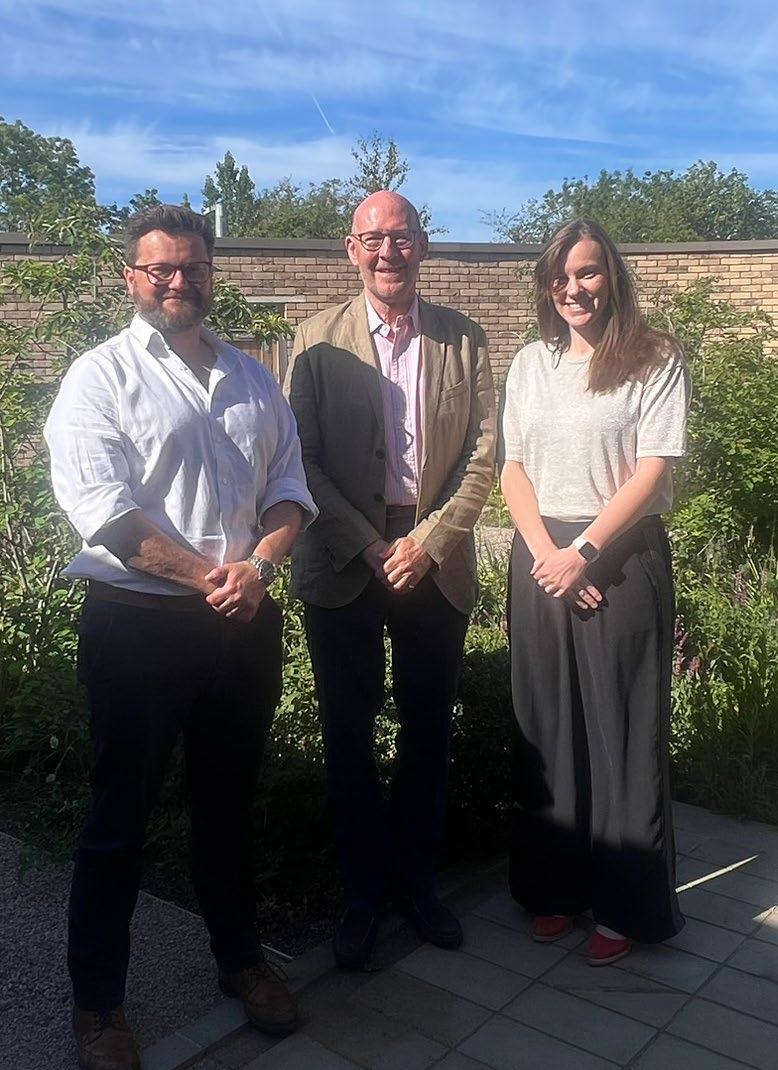
A key focus in 2024/2025 has been the progressive growth of our community services with an expansion into the South Buckinghamshire Primary Care Network (PCN) to provide proactive caseload management alongside our existing acute response services.
We have been proud to care for patients living in South Buckinghamshire for over 30 years and we welcome the added clarity from Buckinghamshire, Oxfordshire and West Berkshire (BOB) Commissioners that our new formal agreement provides. This role for Thames Hospice as lead palliative care provider ensures continuity of care and patient experience across Wexham Park Hospital (WPH), and our Inpatient and Hospice at Home services.
As well as this planned expansion, we have also seen a continued increase in activity within our established population in East Berkshire. This reflects the rising need to deliver palliative and end-of-life care delivered to an increasingly complex group of patients who are living longer with advanced life-limiting illnesses.
This trend is also reflected in our Inpatient Services (IPS) where we have cared for more acutely dying patients admitted directly from hospital. WPH is now the primary source of inpatient admissions for specialist palliative and end-of-life care. We are supporting more people to remain in their homes, bringing our clinical expertise to them in their preferred place of care. We have completed a two-year pilot of our five-bed specialist palliative Virtual Ward and secured a dual funding model with a financial contribution from the NHS, supplemented with a charitable grant to continue this. A service evaluation of the pilot was presented at the Association for Palliative Medicine annual conference in March 2025, and we plan to publish the results of an ethically approved research study, which explored patient experience of care on our Virtual Ward.
We have improved our staffing models to ensure that we deliver high quality, agile patient care. Underpinning this is a framework to ensure patient safety across our clinical services and support services. A new monthly compliance and quality meeting brings together leaders from clinical and non-clinical departments to share learning. The meeting includes trend analysis and learning from incidents, review of outcomes from mortality review meetings, oversight of health and safety around our Hospice and regular spotlights on the contribution that different teams make in supporting our patients.
Looking to the year ahead, we will work more closely with system partners across primary and secondary care, helping to support the movement of care out of hospitals and into community settings closer to home. We plan to align our new compliance and quality structure proportionately with the Patient Safety Incident Response Framework (PSIRF) - with a particular focus on human factors and learning from incidents. We are also embarking on an ambitious and exciting process of digital transformation, which will harness the power of IT and technology to help our people thrive in their roles and support them to focus on the provision of holistic patient care.
Our Children and Families team supporting a group of young people
Quality governance provides a framework for organisations and individuals to ensure the delivery of safe, effective and high quality healthcare. Its purpose is to help organisations, like hospices, and their staff, monitor and improve standards of care.
Thames Hospice is regulated by the Care Quality Commission (CQC). We work closely with them to ensure our services provide people with safe, effective, compassionate and high-quality care, underpinned by continuous quality improvement. We continue to monitor ourselves against the five key questions asked of us by CQC:
Safe – are patients protected from abuse and avoidable harm?
Effective – does our care and treatment achieve good outcomes and promote good quality of life and is evidence based, where possible?
Caring – are patients involved and treated with compassion, kindness, dignity and respect?
Responsive – are services organised to meet patients’ needs?
Well-led – does the leadership, management and governance assure the delivery of high-quality patientcentred care, support learning and innovation and promote an open and fair culture?
Alongside the five key questions, we are also implementing initiatives to measure our performance within the quality statements outlined in the new CQC assessment framework. We are committed to seeking and acting upon feedback provided to us and are dedicated to ensuring our patients’ and their loved ones’ experiences and thoughts are heard.
At Thames Hospice there are several quality governance functions: patient relations; patient safety; health and safety; patient clinical audit and effectiveness, incidents and risk monitoring, policy and quality improvement. Collectively, we work together to ensure our patients receive safe, effective and caring treatment under the umbrella ‘quality’.
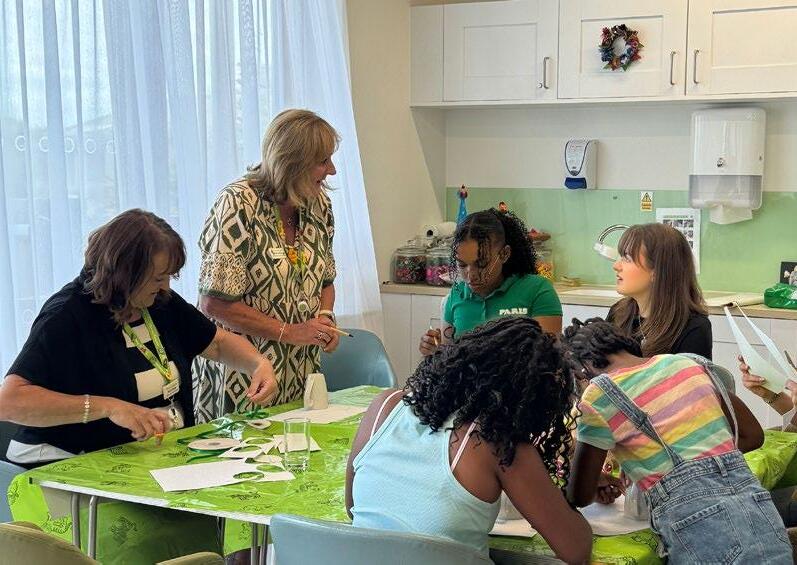
1,615
We present data from 2022/2023 onwards as this is a reflection of usual practice in the post pandemic era, and is consistent with clinical and cultural changes across the Hospice from 2022 onwards.
In 2024/2025, the majority of patients we supported received care in their own homes, helping them manage the impact of their illness and remain comfortable in their own surroundings.
Our Hospice at Home team provide specialist palliative and end-of-life care to patients who wish to die at home, ensuring they can do so with dignity and peace.
Working closely with families and our local healthcare partners—including GPs and District Nurses—our multi-
disciplinary clinical team delivers compassionate, timely, and coordinated support.
This joined-up care includes skilled communication, assessment, symptom control, nursing interventions, tailored personal care, provision of information about the dying process, and dignified care and support before and after death.
Commissioning of hospice care services to South Bucks Primary Care Network (PCN)
Since January 2025, Thames Hospice is delighted to have been commissioned as lead provider for all community and inpatient care services to the South Bucks PCN.
Launched in January 2022, our Health Care Assistants offer
homes who are in the last six weeks of life.
Launched on 1 December 2022, our Virtual Ward is a consultant-led service developed in conjunction with the Frimley Integrated Care Board (ICB) and is available to patients within the Frimley ICB geographical area.
*Four months activity December 2022 – March 2023
The Response Team is a multi-disciplinary team comprising Clinical Nurse Specialists, Paramedic Specialists, Senior Staff Nurses, Health Care Assistants and Doctors.
Following the closure of eight beds on our Inpatient Unit in 2022, our Doctors and Nurse Consultant started seeing patients in their own homes, in clinic and those accessing Outpatient Services at the Hospice. Medical activity is also reflected in the care of patients on the Virtual Ward.
The multi-disciplinary team working on our Inpatient Services provide specialist symptom control, complex palliative and end-of-life care to patients, together with support for their families.
Our Outpatient Services, delivered within the Paul Bevan Wellbeing Centre, support patients with life-limiting illnesses to remain independent whilst introducing the role for hospice support alongside other clinical services. This service has been reviewed to ensure we continue to widen reach and improve access for more patients within our community, and we launched our refreshed outpatient programme in April 2025.
*We closed 8 beds in September 2022.

We were pleased that our contract to provide this essential support to patients living
this year.
has been
This service, delivered by counsellors, pastoral care workers, children’s social workers, chaplain, and children’s support staff, underpins our three clinical areas in the provision of holistic, person-focussed care.
Training is an essential part of our commitment to staff for professional development and safe clinical care for patients. In 2024/2025, we had a continued emphasis on end-of-life care training and we expanded our core training for our clinical professionals. All patient-facing staff received clinical refresher training to bring them up to date with evidence-based practice.
The training and development of local healthcare professionals also continues to be a strong focus of our work, with teaching content tailored to local professional needs and clinical practice.
Co-Connect programme in March 2024.
In 2024/2025, we received eight clinical complaints. Key themes included concerns about communication and time taken to achieve stable symptom control. In each case our senior staff worked with the person making the complaint to understand and resolve issues as quickly as possible.
At Thames Hospice, we are determined that any issue raised by staff, patients, clients, family, friends, carers or visitors is responded to immediately and in person, and that the observations made are listened to. Our policy is that following investigation, immediate changes are made where required to working policies and processes. Furthermore, our staff are immediately advised of any changes needed. Our view is that communication can always be improved and we will continually strive for this.
We continue to use the outcomes and learning gained from any issues raised to improve service provision. Potential issues are routinely reported to our Patient Care and Quality Committee. Significant issues are reported to our Board, the Care Quality Commission (by exception if very high risk) and our NHS Commissioners, as part of our quality reporting processes.
We receive some incredibly positive feedback from patients and their families. And we receive a large number of accolades across all our services. Some extracts from these accolades can be found on page 18.
In 2024/2025 we also gathered feedback using iPads at our reception desks. This system enables everyone using any of our services to give immediate feedback.
Analysis of this feedback showed an overall score of 100% Excellent or Good in 2024/2025
We also record the many thank you cards and letters that we receive each month across all our services.
The views and experiences of patients and their families are very important to us and enable us to look at how we can learn, develop and improve the services we provide. Feedback is reported quarterly at the Patient Care and Quality Committee. We are often very privileged to relay a patient or family member’s experiences of the Hospice. We find this very thought-provoking and supportive of core service decision making throughout the organisation. Local care homes
I am so grateful to the Hospice for my bereavement counselling. I have taken on board everything that you have discussed with me, and I cannot tell you how much it has helped. I feel am mentally in a better place to help both myself and my children with our grief.
Thank you for all the wonderful work that you do and the smiles that each and every one of you carry with you as you do your jobs. You have the kindest hearts and it is clear that the patients and their families are your priority. Thank you for all of the care and support.
The service you provide is fantastic. In people’s hour of need you were always here. Indeed, in my hour of need you were there. I can’t thank all the nurses enough who came out in the middle of the night to give my loved one comfort and support.
You supported us all and made a very sad, difficult time a bit more bearable. Thames Hospice is a very special place, and you all do amazing work there.
You all do such an amazing job and work tirelessly hard. Your warm smiles and friendly chats brightened up our days.
We thank you with all our hearts for the wonderful and compassionate care you gave. Nothing was too much for your team. We felt comforted knowing how well our loved one was being looked after by you all, and grateful for having such a wonderful space to share in their last few days.
We use Vantage, an online incident reporting system. This gives us a streamlined incident reporting process and enables us to produce in depth reports for governance monitoring. Vantage is used throughout the organisation and is mandated as the standard reporting tool for all staff. The Executive Team and relevant team leaders are automatically notified of any incidents. All reported incidents are reviewed at a monthly compliance and quality meeting that colleagues from across the Hospice attend. Our Patient Care and Quality Committee
receives and reviews a quarterly report on all clinical incidents that are reported.
335 (365 in 2023/2024) clinical incidents and accidents were reported and investigated during 2024/2025, with 162 of them reported ‘for the record’ only or as ‘near misses’. Some incidents were reported by us to other organisations as they were incidents our staff had found and reported, but were not our incidents, or were for the record only. The table below summarises clinical incidents that we investigated.
Due to the ongoing deteriorating nature of their condition, patients were admitted with established pressure ulcers. We have procedures that we implement to care for these patients, including special mattresses and turning plans. Pressure
Medium
Our visits were made easier knowing we were in safe hands. Our loved one always looked calm, comfortable and peaceful.
Drug incidents 58 Various
The progression of disease in some of our patients meant that low-grade pressure ulcers formed. We implement a range of interventions to minimise this risk where at all possible and also learn from cases to improve future care.
Each drug incident was investigated.
Clinical staff involved undertook reflective reviews, and learnings were shared with all clinical staff. Trend analysis also helps us identify any recurrent themes for targeted training.
Patient slips, trips and falls 26 Various In most incidents our patient was unharmed.
Patient safety and care 13 Various In most incidents our patient was unharmed.
Information governance 5 Low Minor incidents; promptly resolved.
In 2024/2025 there were no cases of patients with a new diagnosis of Clostridium Difficile infection or a blood stream MRSA infection. No vomiting and diarrhoea outbreaks took place at the Hospice over this period. We carried out regular infection control audits in 2024/2025 and no infection control incidents were reported.
We use EMIS, an electronic patient record system. This enables the sharing of patient data with our local GPs and some community partners, resulting in better co-ordinated care and treatment, and increased responsiveness as information is shared more quickly and efficiently.
Hospice UK has developed a benchmarking tool for hospices – the Inpatient Quality Metrics. These record benchmarking data on falls, pressure ulcers and medication incidents. The data indicates that our bed occupancy levels are consistently well above average, meaning that we have helped as many people as possible without compromising patient care. We are proud that overall our results compare very favourably with those of other hospices.
In 2024/2025:
• Our inpatient beds have been 84% occupied.
• The number of falls per 1,000 bed days was on average below those reported by other hospices.
• We reported no serious medication incidents.
The 2024 independent FAMCARE Audit was undertaken during summer 2024. This year 22 specialist palliative care inpatient units, including Thames Hospice, took part in the survey. This is an annual audit measuring family and carer satisfaction with our services, and focuses on communication, support and symptom management. Taking part in FAMCARE enables us to identify our strengths, to address concerns, and to improve the quality of our services. In addition, it ensures that families feel heard and it supports our commitment to compassionate, responsive service.
We sent FAMCARE surveys to the next of kin of people who had died at Thames Hospice in our Inpatient Services between 1 June and 31 August 2024. It was our eighth year participating in the FAMCARE Audit.
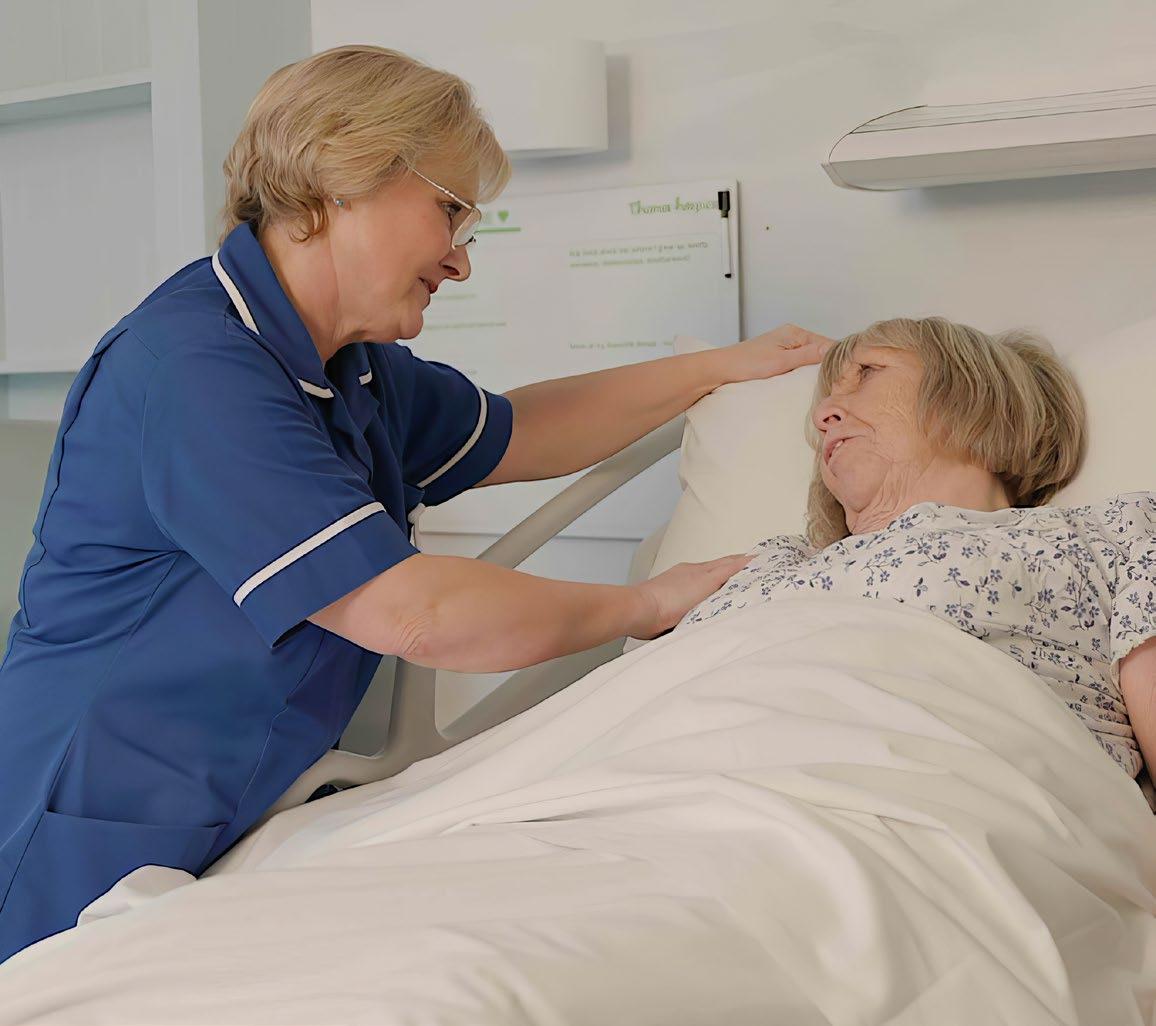
To ensure that we are continually meeting standards and providing a consistently high quality of service, Thames Hospice has an audit and monitoring programme in place. This enables us to monitor our services in a systematic way, identifying areas for audit and evaluation in the coming year.
Our focus is on quality and benchmarking of services, patient safety, good record-keeping, infection control standards and legislation compliance. Our audits create a framework where we can review information and identify where we can make improvements.
Regular Patient Care and Quality Committee meetings provide a forum to monitor quality of care and to discuss quality and audit evaluation results.
The Thames Hospice Audit Plan 2024/2025 identified audits against the five key lines of enquiry as set by the Care Quality Commission; some examples from our 2024/2025 clinical audit plan are detailed below.
The care after death audit ensures that all procedures following a patient's death are carried out with dignity, sensitivity and in line with our policy. Results of the audit are communicated with family, staff and stakeholders. It identifies areas for improvement, supporting the Hospice’s continuous service improvement strategies.
The ReSPECT audit checks that the ReSPECT documentation records a patient’s wishes and clinical decisions about any emergency care are clearly recorded and regularly reviewed. This helps us ensure that we uphold and support patient autonomy, and shared decision making, and therefore that, where possible, care aligns with individual preferences and clinical needs. Outcomes of these audits are discussed at compliance meetings and shared with the clinical teams to promote continuous improvement.
The monthly falls audit looks at falls in our Inpatient Unit and helps to identify any areas for learning. The audit is completed by the Ward Sisters or Inpatient Services Manager, with any learnings communicated to the team. Examples of learnings have been the importance of a timely review of risk assessments and the regular checking of sensor mats in use for any faults.
Controlled drug audit and CDAO audit
Fire risk audit
The quarterly controlled drug audit and annual CDAO audits are undertaken to ensure the safe and lawful management of controlled drugs. As part of the audit process, drug registers are reviewed, stock levels verified, and staff practices observed to ensure full compliance. Any discrepancies or areas for improvement are addressed through immediate action, including staff training, process refinement, or policy revision. These audits reinforce a culture of safety, accountability, and clinical excellence in the use of medicines that support essential comfort and symptom control for our patients.
The annual fire risk audit is essential to proactively identify and mitigate potential fire hazards and complies with the Regulatory Reform (Fire Safety) Order, and ensures we have a proactive and preventative culture. All actions from the audit are added to the action plan and addressed in a timely fashion, with collaboration across departments.
Patient safety bulletin
The monthly morbidity and mortality review allows a critical review and evaluation of patient safety and clinical outcomes. This enables the identification of what went well, and areas for improvement, with the shared learning across teams, promoting a culture of continuous improvement and enhanced clinical practice.
We undertake regular call bell audits, which helps us to identify and address issues that could compromise patient safety. This could include unresponsive systems or inaccessible call points, and any delays in answering patient call bells. Areas where delays are found are investigated, addressed and highlighted to leadership teams, therefore ensuring patient safety, satisfaction and confidence in the service provided.
Completed quarterly, this bulletin to all clinical staff highlights important safety issues, incidents and lessons learned – thus keeping staff informed about potential risks, best practices, and safety protocols. By sharing timely updates and promoting safety initiatives, the bulletin supports high quality patient care standards.
Patient bereavement survey
Effective Patient demographic audit
Antimicrobial audit
The patient demographic audit gives insight into the characteristics of the population served, including age, gender and ethnicity. It provides the Hospice with valuable information to ensure that we offer an equitable service that is accessible and is tailored to the needs of the local community.
The antimicrobial audit enables monitoring of prescribing patterns, preventing overuse or misuse of antimicrobial medications. The audit supports best practice in medication management, thus enhancing patient safety, and aligning with our regulatory obligations.
Data flow mapping audit
Clinical compliance and quality meeting
The patient bereavement survey collates feedback from families and loved ones of their experience of our Inpatient Services. Sharing the outcome of this survey, reinforces best practice, enables review of any areas for improvement and informs ongoing service improvement. It helps us to ensure that the care we provide continues to meet the needs and expectations for those we serve.
The DBS audit helps us ensure that we maintain a safe environment, with appropriate staff and volunteers who have up to date background checks, thus supporting a culture of safety, accountability and trust amongst staff, stakeholders, and patients.
The annual data flow mapping audit investigates how operational data is collected, stored, processed and shared in line with data protection regulations, and highlights any potential risks and vulnerability, ensuring effective management transparency, and that privacy and confidentiality are always upheld.
Monthly compliance and quality meetings—covering both clinical and non-clinical areas—are held to ensure that leaders and staff regularly review practices, policies, and regulatory requirements, maintaining the highest standards of care. These meetings allow teams to discuss audit findings, address areas for improvement and foster a culture of learning through continuous improvement which helps us to enhance patient outcomes, and staff retention and wellbeing.
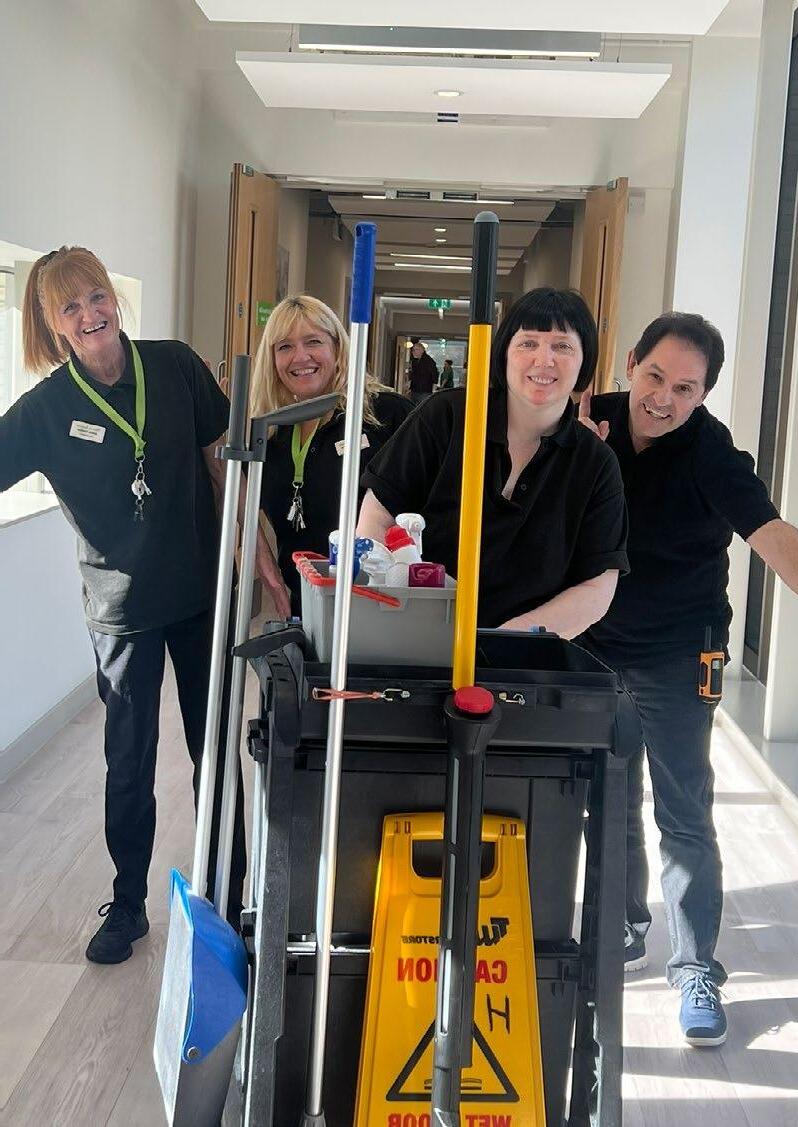
In 2024/2025, we completed a submission against the NHS Data Security and Protection Toolkit. The Data Security and Protection Toolkit is an online self-assessment tool that allows organisations to measure their performance against the National Data Guardian’s ten data security standards. All organisations that have access to NHS patient data and systems must use this toolkit to provide assurance that they are practising good data security and that personal information is handled correctly. As in previous years we were one of the very first hospices in the country to complete a submission, and we are pleased that it was compliant with all NHS standards for information management, confidentiality, data protection assurance, information security, clinical information and records holding.
Thames Hospice was inspected by the Care Quality Commission (CQC) in August 2021. Staff and volunteers at Thames Hospice had much to celebrate after receiving an ‘outstanding’ rating following the inspection. The inspection outlined how we were meeting the CQC national standards. The Hospice is not subject to any special reviews under section 48 of the Health and Social Care Act 2008.
Under the new CQC inspection regime, hospices are subjected to the same level of scrutiny as hospitals, making this ‘outstanding’ rating incredibly special. The CQC found that Thames Hospice is outstanding in responding to people’s needs, treating families with dignity, kindness and respect and being well-led.
To access a full copy of this and past reports, please go to www.cqc.org.uk/location/1-9676860611 or visit our website at www.thameshospice.org.uk where there is a link to the report at the bottom of our homepage.
In 2024/2025 we continued to work with our assigned CQC inspector. We ensure that the CQC are informed of any significant clinical developments at the Hospice.
Thames Hospice promotes a culture that encourages candour, openness and honesty at all levels of the organisation. We have a culture of safety and a commitment to transparency that permeates everything we do.
The duty of candour is a legal duty to be open and honest with patients and their families when mistakes in care have led to significant harm. It applies to all health and social care organisations registered with the regulator, the CQC. We recognise that the promotion of a culture of openness and transparency is essential to improving and maintaining patient safety.
Our duty of candour policy provides guidance to clinical employees about the principles of being open and duty of candour, and sets out the processes to be followed to support openness with patients and their families following a serious safety incident. In addition the accident and incidents reporting policy provides a clear and transparent process for the management of clinical incidents, including reporting. All incidents are discussed at the monthly accident and incident review panel and are also reported to relevant trustee committees and Board.
We encourage speaking up across our Hospice. Staff are encouraged to confidentially raise any issue or concern through a number of routes. Our hope is that staff will always feel able to approach their managers should they have any concerns; and with our ‘Peoples’ Voice’ sessions we have an active staff forum where issues are often raised.
We also have an independent Freedom to Speak Up Guardian, supported by Freedom to Speak Up Champions from across the organisation. One of our Trustees is also our Freedom to Speak Up Trustee, and all our Trustees have made their contact details freely available to staff should they wish to raise an issue and want to speak to a Trustee.
Part three
We will provide agile, responsive care and support for our patients and their loved ones in their preferred place of care
How will priority be achieved?
Collaborative working with hospice teams and our healthcare partners across the community to deliver responsive care. Develop our data capture and reporting to evaluate and guide service delivery.
How will progress be monitored & reported? Outcome
Feedback from multidisciplinary team meetings. Creation of patient-focussed outcome measures which will be reviewed alongside patient and family feedback. Weekly and monthly trends analysis will be reviewed at quarterly clinical committee meetings and Board meetings.
We will provide excellent standards of care within financially sustainable models
Clinical leaders will be trained and supported to develop detailed understanding of charitable funding and budget management.
Clinical budgets will be set within clear financial frameworks and monitored with monthly review and forecasting. Oversight will be provided at the finance and income generation committee.
We will ensure our clinical services offer choice and are delivered safely to achieve the optimum experience for our patients and their loved ones
Empowerment of our clinical leaders to offer choice across safe clinical settings. Create a culture and system for learning which has patient experience at its core.
Review patient experience across our range of services including transparent review of incidents, lessons learned and trends analysis as part of robust compliance and quality monitoring.
We will facilitate choice by reaching patients earlier in their disease trajectory and support earlier care planning
Advocate for palliative care services and tell our story to our local population.
Use our Outpatient Services to introduce patients and families to the Hospice earlier.
Analysis of referral rates to our Outpatient Services and review of outcomes from outpatient care.
We have developed a suite of metrics which monitor clinical performance across our services. These are reviewed monthly to shape service delivery and discussed quarterly at our patient care and quality committee and with our commissioners.
Investment and development of our Finance Team has supported partnership working with clinical leaders to enhance efficient management of costs whilst ensuring safe care standards are met.
Learning culture and robust clinical governance has been embedded across the Hospice through the compliance and quality meetings.
The model of care delivered by our Outpatient Services has been redesigned in 2024/2025 and the new structure was launched in April 2025.
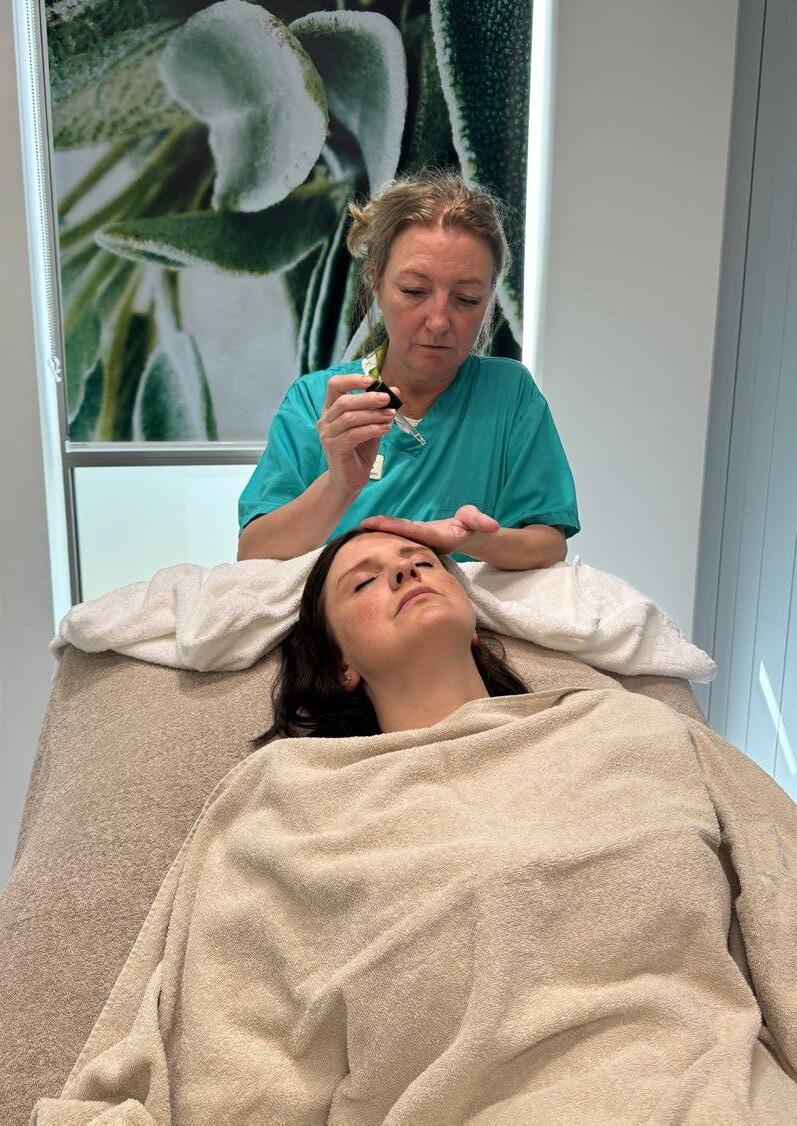
In November 2024, we launched our refreshed strategy which sets out our ambitious plans and key priorities for the next three years. Underpinning this strategy are a suite of measures which shape our clinical focus for 2025/2026.
Key clinical priorities for the next year
Strategic priority What How
Care with agility Coordinate care across our clinical services and with our partners.
Support and develop a resilient clinical workforce.
Review our use of the EMIS electronic patient record system to optimise recording of patient information, coordinate information sharing and improve data analysis.
Review the team structure and staffing for our Hospice at Home service to address the demands of increased activity.
Clinical supervision training for Inpatient Services.
Underpin clinical care with continuous quality monitoring and improvement.
Extending reach Improve multi-disciplinary team partnership working within the population we serve.
Align our new compliance and quality structure proportionately with the patient safety incident response framework with a particular focus on human factors and learning from incidents.
Develop close partnership working with paramedic and clinical specialist hospice teams to enhance shared decision making and support hospital avoidance.
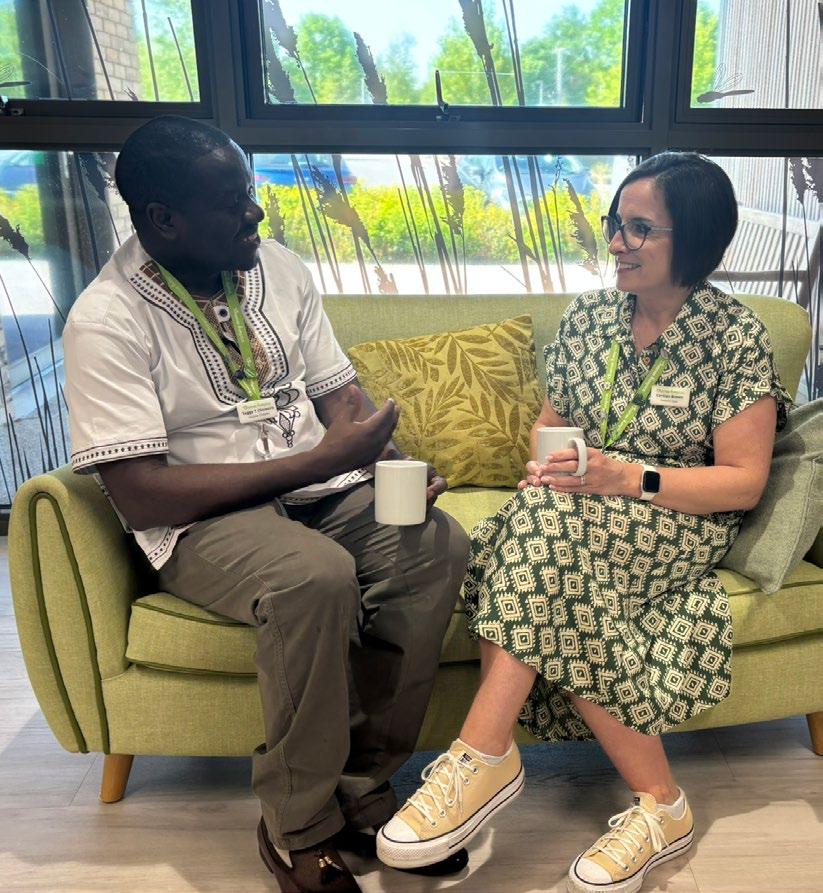
Part five
Our Trustees are committed to the Hospice’s quality agenda. Our governance structure is extremely thorough, robust and well-established and all our Trustees play an active role in supporting the Hospice, and ensuring that all our services are of the quality that we have promised to our stakeholders.
The following are statements all providers are required to include in their Quality Account. Because we are an independent charity providing palliative care, not all of these statements are directly applicable to Thames Hospice.
We are a core provider of complex, specialist palliative and end-of-life care to adults over the age of 16 years. Our care is delivered at the Hospice and in patients’ usual place of residence.
During 2024/2025, we supported local NHS commissioning priorities by providing palliative and end-of-life care across key services:
• Inpatient Services
• Hospice at Home
• Outpatient Services
• Lymphoedema Services
• Counselling, Pastoral and Bereavement Support
In addition, we provide a comprehensive range of education, training and support for external healthcare professionals such as care home staff, community nurses and GPs.
The income provided by the NHS represented approximately 30% of the total income generated by Thames Hospice in the reporting period 2024/2025. The balance of our expenditure on charitable activities was raised through the generous support of our community, including legacies and fundraising, as well as income generated from our retail activities and our investments.

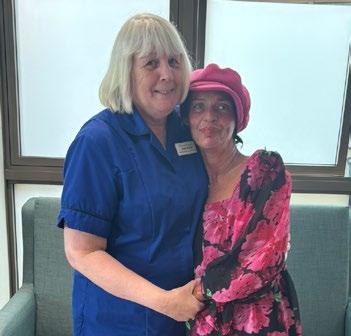
Symptom management for patients with complex palliative physical, psychological, social or spiritual symptoms which cannot be managed by generalist services or specialist community services. Our services include:
Proactive and responsive clinical support
Our multi-disciplinary team of Clinical Nurse and Paramedic Specialists, Senior Staff Nurses, Doctors and Health Care Assistants deliver 24/7 comprehensive palliative and endof-life care services for patients with complex needs in their place of residence.
Our Virtual Ward is available to patients within the Frimley Integrated Care Board geographical area. It provides medically-led care for acutely symptomatic patients in the final stages of life in their own homes. The Medical Team is supported by Clinical Nurse Specialists, Paramedic Specialists and Health Care Assistants in the delivery of this service.
Care Team
We offer Health Care Assistant-led compassionate support and personal care to people with a palliative diagnosis in their own homes who are in the last six weeks of life.
24-hour telephone advice line
We provide a 24-hour palliative and end-of-life care telephone service to give advice to people with palliative care needs and their families, as well as to healthcare professionals who need guidance and support on delivering palliative care. The team is available 24/7, 365 days a year, to provide guidance on symptom control, practical advice and emotional support.
Symptom management for patients with complex palliative physical, psychological, social or spiritual symptoms which cannot be managed by generalist services or specialist community services. This may include:
1 Inpatient beds for complex palliative and end-of-life care usually for up to two weeks stay.
2
Intermediate care beds for patients approaching the end of life with an estimated prognosis of six weeks.

Physiotherapist Iulian with Ali in our Rehabilitation Suite
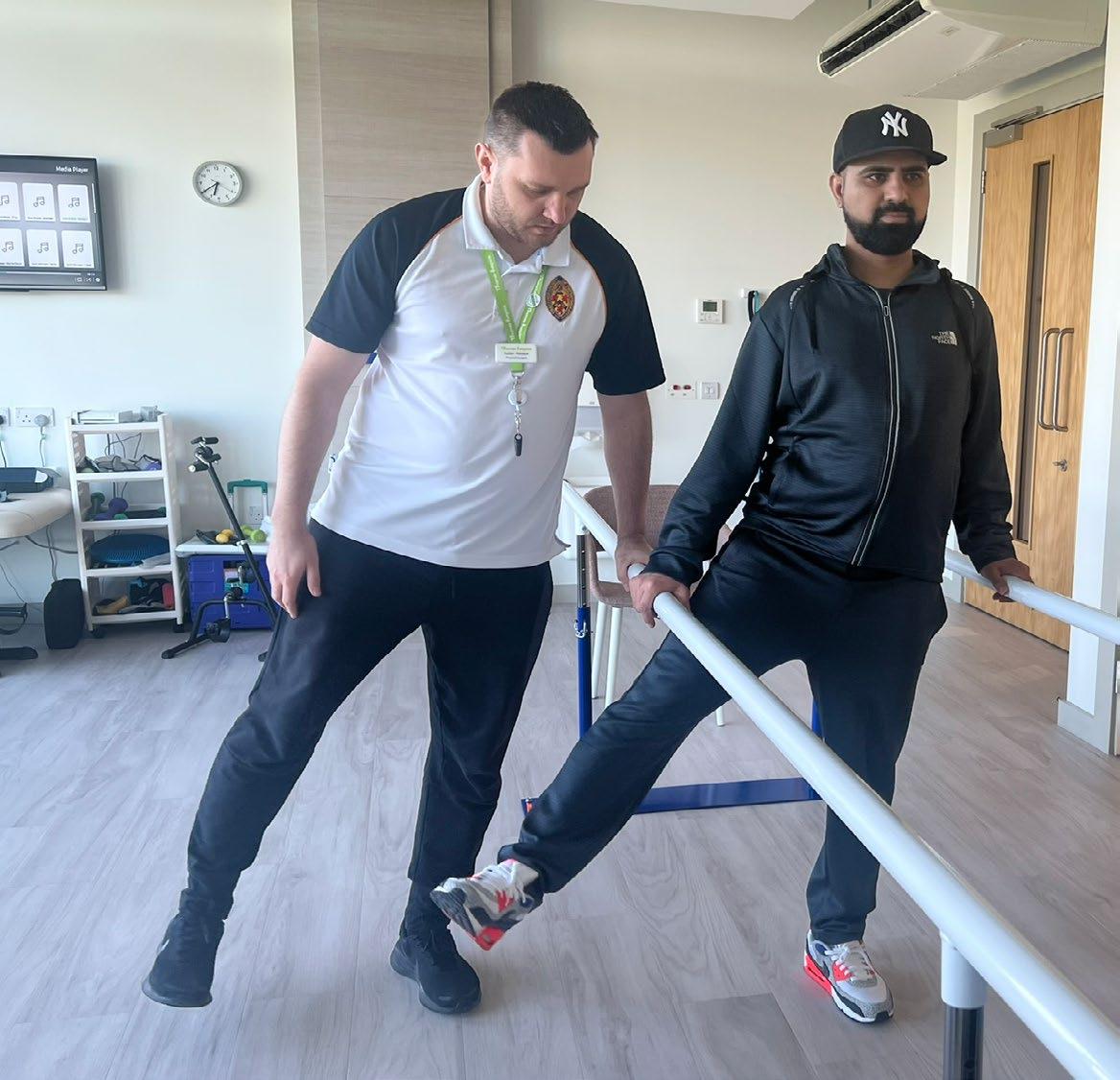
Our Counselling Team provides emotional support for patients and families up to and following bereavement, which includes counselling for children and young people. Our Counselling Support Services are delivered by qualified counsellors, trained bereavement support volunteers and is further supported by the Pastoral Care team.
(delivered in our Paul Bevan Wellbeing Centre)
Six-week outpatients programme
We help patients diagnosed with a life-limiting condition remain independent by supporting them through tailored programmes of wellbeing and therapeutic care within our Paul Bevan Wellbeing Centre at the Hospice.
Complementary therapy
The Complementary Therapy Team offers a variety of therapeutic treatments for patients and carers (also available for patients staying on our Inpatient Unit). Therapies include massage, reflexology, Reiki, aromatherapy, visualisation techniques and therapeutic touch.
Lymphoedema service
This is a nurse-led service for people with primary Lymphoedema or as a result of cancer and its treatments.
Physiotherapy
Our Specialist Palliative Physiotherapists play a key role in improving our patients’ quality of life, helping to optimise their mobility and wellbeing, to live as independently and fully as possible.
Participation in National Clinical Audits
Thames Hospice is not part of the NHS and currently has not participated in national clinical audits or national confidential enquiries.
Thames Hospice, in conjunction with the University of Cardiff, supported an ethically approved research study exploring patient experience on our Virtual Ward. Research governance was led by the University of Cardiff and monitored locally via the Thames Hospice Patient Care and Quality Committee.
Completeness of Data Submitted to the Secondary Uses Service (SUS)
As a specialist palliative and end-of-life care provider that is not part of the NHS we do not submit data to SUS because we are not eligible to participate in this scheme.
The Hospice’s income during 2024 - 2025 was not conditional on achieving quality improvement through the Commissioning for Quality and Innovation (CQUIN) payment framework because it was not eligible to participate in this scheme as a third sector organisation. We are required to record the number of patients seen in the community setting.

Our vision
Quality of life to the end of life, for everyone.
Our purpose
To provide complex, specialist palliative and end-of-life care to local people facing a life-limiting diagnosis, giving them dignity, comfort and the best possible quality of life in their preferred place of care.
Our values
Compassion
Compassion for everyone in a safe, caring environment.
Ambition
The desire and determination to serve everyone in our community.
Respect
Respect for everyone’s dignity.
Excellence
Committed to excellence in everything we do.

